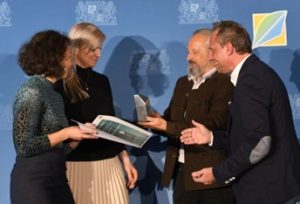We are very late again.
You may have wondered if C2C still exists.
But you’ll see, a lot has happened in 2022.
We don’t write a newsletter or send a donation letter every month,
we can’t do it in time next to our company.
We would like to send out three newsletters a year to keep you up to date.
Let’s see if we can do that in 2023.
On a practical level, a lot has progressed in 2022.
SUCCESSES AND PROGRESS
Bavarian Climate Protection Award 2022

We were awarded the Bavarian Climate Protection Award in October.
IONOS sustainability impact award 2022
We also received an award for the best website in the field of sustainability (IONOS sustainability impact award 2022) from IONOS. We are happy about this and especially Jakob from Jeysign studio, as well as Karén Stenzel, who was responsible for the marketing and the texts.

Cranes Conservation Volunteers (Kenya)

Our cooperation with Cranes Conservation Volunteers (Kenya) is bearing fruit.
Or rather, vegetables grow because we planted a large garden there for a primary school in September.
Of course, with biochar from water weeds (Salvinia molesta).
Now the children and their families have a lot of vegetables to eat.
The garden was financed by students of the Theodor Mommsen School in Bad Oldesloe. If you are more interested, you are welcome to get the monthly reports with impressive photos from us. Just write an email.
Thanks to Detlef. He organized the financing.
Bahari Hai and AGA (Kenya)
In Watamu/Kenya we have supported Bahari Hai and AGA (www.aga-artenschutz.de)professionally and financially to create a large garden for an entire village. Because of the high food prices, people have started to eat the endangered sea turtles again.
The garden is intended to solve the food shortage.
There will also be more cultivation areas. In the future, tree and shrub cuttings will no longer be burned, but charred.
This is climate protection and food security and the protection of sea turtles.
A very special thank you to the Giving Circle from Hamburg, organized by Susanne Kersig. C2C has received €30,000 to protect the climate, protect species, create food security and create prosperity.
First start-up in Negeria
Peter Bassey from Nigeria was our first start-up.
He no longer needs our support. His company is running. That was and is our goal. Empowering people and making them independent.
Soon we will launch a new C2C start-up in Cape Town. Many unemployed young people will turn WHZ into biochar. More about this in the next newsletter.
We have improved our kiln. We have improved the biochar yield from 20% to 30%. Thanks to Theo Kadau. He stood in the garden with Walter in January ́22 and they made the experiments. We also have a video about it.
It has not (yet) been cut. If you are interested, just write an email and we will send it via WeTransfer, because that is 645 MB data volume.
WHAT WE LEARNED
We applied to Elon Musk’s XPrize .
A concept should be developed that shows that one giga-ton of CO2 can be removed from the atmosphere every year. That is one billion tons of CO2 per year. That’s a house number. But it works with all the water weeds that grow worldwide. We didn’t win because the jurors believe that there are not enough water hyacinths. But there is.
And because you can’t produce enough biochar with the conversion of old oil drums. Back-office bureaucrats! (Walter’s way of expressing himself)
But we still have the main prize for us:
There are over 500,000,000 hectares of marginal arable land in sub-Saharan Africa. That is 42 times the arable land of Germany.
Little grows on these depleted tropical soils because the soil cannot hold water and nutrients.
Compared to Germany with its good soils, you need more water and more nutrients for the same amount of harvest. The nutrients are washed out regularly.
The water evaporates.

Better harvests can only be achieved with better soils!
If we apply biochar to these depleted soils, we will improve the soils. The biochar stores nutrients and water.
We improve profitability.
As a result, we multiply harvests, reduce fertiliser costs and store water.
What is also crucial for climate protection:
In the soil, microorganisms grow on the biochar.
Humus is formed again. In the process, a lot of CO2 is stored by the microorganisms. And it stays there because the humus remains!
Scientists are not yet clear whether this is 5 or 175 times the original amount of biochar.
We don’t care now, we’ve just already started and will continue.
The first thing we need to do in Africa is to improve the soil with biochar.
This is the only way we can create food security. And water weeds, such as water hyacinths, are the best and easiest biomass available for biochar. They are available in large quantities. We don’t have to cut down a single tree for it. Once 2 kg of biochar per m³ is enough for the next 1,000 years.
It sounds so simple. It’s that simple.
It just has to be done. We have to do it.
What didn't work out?
- We didn’t get the $1 million at XPrize.
- We also applied to SprinD. This is the Federal Agency for Disruptive Innovations in Leipzig. Yes, there is such a thing.
- We have also received a rejection here.
- How we assess it: Our Kiln doesn’t look like sexy high-tech.
- And most of them have not heard of water hyacinths.
- And you can’t really invest because the returns and benefits benefit the local people.
- We still have to do educational work on this!
OUR PLAN FOR 2023
- Concept for high-yield gardens at schools in the Global South.
- The association SchuPa e.V. from Bavaria supports 5 schools in Tanzania. We are now implementing the C2C school garden concept in two schools. There they are already growing corn and vegetables for the school kitchen. The yields are modest. Lots of space. A lot of work. Little yield.
- A new (high-yield) garden will be created within the school and the existing gardens and fields (several hectares) will be made more productive. We also learn a lot in the process.
- The aim is to have a project concept that each school can implement itself. We support this through existing organizations such as SchuPa. We see this as the most effective way to implement our know-how quickly and successfully. In January, they began improving the soil of the new gardens within the schools. These gardens can then also serve as training gardens for the students
Start-up in Cape Town/South Africa
In a river through a township in Cape Town, water hyacinths block everything.
There is a canoe club in which 50 unemployed young people are organized. They earn some money with canoe tours for tourists.
At first, Corona prevented her small income. Now it is the water hyacinths that prevent this.
The young people have taken out the water hyacinths so that they can go on the canoe tours.
Now Marlene from Berlin had the idea that we could also make biochar here. She established the contact between the canoe club and C2C.
We will finance it until it is economically viable. Just like Peter Bassey.
We’ll tackle it!

Butterfly Kindergarten in Cape Town/South Africa
We want to make a high-yield garden there.
This is also a training and demonstration garden for the inhabitants of the townships. There, the soil is sandy and infertile.
The poor have been pushed to the worst soils. With the biochar from the canoe club, we improve the soil and thus create food security.
We have submitted an application for funding to the Bavarian State Chancellery. Fingers crossed that we get the money for the project.
We are doing the project in cooperation with The Light Project e.V (Doris)) and Dooiy (Marlene and Christian from Berlin).
Lake Ol'Bolossat/Kenya with Cranes Conservation Volunteers
There are large areas of Salvinia molesta there. A water fern that suppresses everything. All the reeds have disappeared. The crowned cranes no longer have any protection during breeding.
We want to produce more biochar. We don’t yet know how to calculate the climate protection effects at Salvinia. That’s what we want to find out this year.
Let’s see how it all works out this year.
It will probably be better than we imagine.
Support

If you want to continue to support our work, we would be very happy!
With a little money, we can make a big difference.
With 600€ we have created a garden at Lake Ol Bolossat, which now provides food security for over 50 people and soon all 350 villagers.
And cranes are no longer hunted to eat because people are hungry.
Now there are vegetables.
Every CO2 compensation and every donation helps!
We wish you a great new year 2023!
Sincerely,

Your Katharina from Char2Cool e.V.







